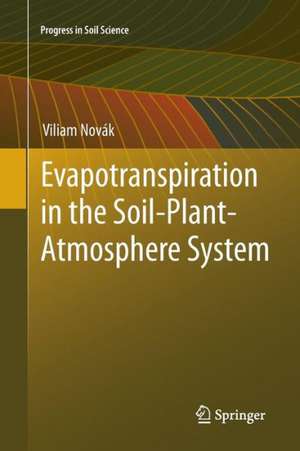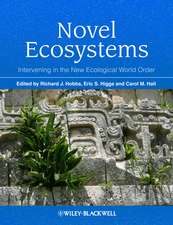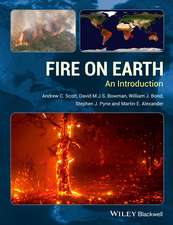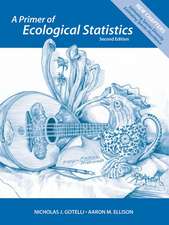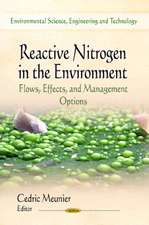Evapotranspiration in the Soil-Plant-Atmosphere System: Progress in Soil Science
Autor Viliam Novaken Limba Engleză Paperback – 18 iul 2014
Key themes: soil hydrology – evapotranspiration – hydropedology– plant physiology – water movement in soils – evaporation – transpiration
Dr. Viliam Novák is a water resources scientist at the Institute of Hydrology of the Slovak Academy of Sciences in Bratislava (Slovakia).
| Toate formatele și edițiile | Preț | Express |
|---|---|---|
| Paperback (1) | 558.63 lei 38-44 zile | |
| SPRINGER NETHERLANDS – 18 iul 2014 | 558.63 lei 38-44 zile | |
| Hardback (1) | 645.47 lei 6-8 săpt. | |
| SPRINGER NETHERLANDS – 28 iun 2012 | 645.47 lei 6-8 săpt. |
Preț: 558.63 lei
Preț vechi: 698.29 lei
-20% Nou
Puncte Express: 838
Preț estimativ în valută:
106.93€ • 116.19$ • 89.88£
106.93€ • 116.19$ • 89.88£
Carte tipărită la comandă
Livrare economică 17-23 aprilie
Preluare comenzi: 021 569.72.76
Specificații
ISBN-13: 9789400797581
ISBN-10: 9400797583
Pagini: 272
Ilustrații: XVI, 256 p.
Dimensiuni: 155 x 235 x 14 mm
Greutate: 0.39 kg
Ediția:2012
Editura: SPRINGER NETHERLANDS
Colecția Springer
Seria Progress in Soil Science
Locul publicării:Dordrecht, Netherlands
ISBN-10: 9400797583
Pagini: 272
Ilustrații: XVI, 256 p.
Dimensiuni: 155 x 235 x 14 mm
Greutate: 0.39 kg
Ediția:2012
Editura: SPRINGER NETHERLANDS
Colecția Springer
Seria Progress in Soil Science
Locul publicării:Dordrecht, Netherlands
Public țintă
ResearchCuprins
Evapotranspiration – component of water cycle.-
-Evaporation process and its basic properties.-
-Evaporation and kinetic theory of fluids.-
-Water balance and water cycle.-
-Energy balance of the evaporation area.-
Soil–plant–atmosphere system.-
-Water.-
-Soil and other parts of Earth surface.-
-Basic soil properties.-
-Canopy.-
-Atmosphere.-
Evaporation from different surfaces.-
-Evaporation of intercepted water.-
-Evaporation from free water surface.-
-Evaporation from snow and ice.-
-Evaporation from urban territories.-
-Transpiration.-
-Potential evapotranspiration.-
Transport of water and energy in the boundary layer of atmosphere.-
-Meteorological characteristics of the boundary layer of atmosphere vertical distribution.-
-Coefficients of heat and water vapour transport in the SPAC system.-
Movement of water in soil during evaporation.-
-Bare soil evaporation.-
-Soil water content profiles during bare soil evaporation.-
-Transport of water and heat in an unsaturated porous media.-
-Soil water transport quantification in isothermal conditions.-
-System of equations describing the transport of heat and water in porous media.-
Movement of water in the soil root zone during transpiration.-
-Water in a soil root zone.-
-Roots system.-
-Field measurements.-
-Methods of soil water uptake patterns calculation.-
-Mesoscopic approach to water uptake by plant roots.-
The role of plants in transport processes in the Soil – Plant – Atmosphere system.-
-Transport of water from soil through plant to the atmosphere and its quantification.-
-Transpiration control by stomata.-
-Canopy and stomata conductivity during transpiration.-
Evapotranspiration and soil water.-
-Evapotranspiration and soil water content.-
-Evapotranspiration and soil–water potential.--Transpiration and uptake of water by roots during combined water and salinity stress.-
Methods of evapotranspiration estimation.-
-Evapotranspiration measurement.-
-Methods of evapotranspiration calculation.-
-Micrometeorological methods of evapotranspiration estimation.-
-Measurement and evaluation of sap flow data in trees and stands to evaluate transpiration rate.-
Evapotranspiration components structure.-
-Potential evapotranspiration components structure.-
-Components of evapotranspiration: Daily and seasonal courses.-
Combination method of daily evapotranspiration calculation.-
-Distribution of land according to the type of evaporating surface.-
-Net radiation of evaporating surfaces.-
-Potential evapotranspiration of homogeneous surfaces.-
-Potential evapotranspiration components.
-Actual evapotranspiration calculation.-
Estimation of regional evapotranspiration using remote sensing data.-
-Energy balance method.-
-Regional evapotranspiration estimation using complementary relationship.
-Evaporation process and its basic properties.-
-Evaporation and kinetic theory of fluids.-
-Water balance and water cycle.-
-Energy balance of the evaporation area.-
Soil–plant–atmosphere system.-
-Water.-
-Soil and other parts of Earth surface.-
-Basic soil properties.-
-Canopy.-
-Atmosphere.-
Evaporation from different surfaces.-
-Evaporation of intercepted water.-
-Evaporation from free water surface.-
-Evaporation from snow and ice.-
-Evaporation from urban territories.-
-Transpiration.-
-Potential evapotranspiration.-
Transport of water and energy in the boundary layer of atmosphere.-
-Meteorological characteristics of the boundary layer of atmosphere vertical distribution.-
-Coefficients of heat and water vapour transport in the SPAC system.-
Movement of water in soil during evaporation.-
-Bare soil evaporation.-
-Soil water content profiles during bare soil evaporation.-
-Transport of water and heat in an unsaturated porous media.-
-Soil water transport quantification in isothermal conditions.-
-System of equations describing the transport of heat and water in porous media.-
Movement of water in the soil root zone during transpiration.-
-Water in a soil root zone.-
-Roots system.-
-Field measurements.-
-Methods of soil water uptake patterns calculation.-
-Mesoscopic approach to water uptake by plant roots.-
The role of plants in transport processes in the Soil – Plant – Atmosphere system.-
-Transport of water from soil through plant to the atmosphere and its quantification.-
-Transpiration control by stomata.-
-Canopy and stomata conductivity during transpiration.-
Evapotranspiration and soil water.-
-Evapotranspiration and soil water content.-
-Evapotranspiration and soil–water potential.--Transpiration and uptake of water by roots during combined water and salinity stress.-
Methods of evapotranspiration estimation.-
-Evapotranspiration measurement.-
-Methods of evapotranspiration calculation.-
-Micrometeorological methods of evapotranspiration estimation.-
-Measurement and evaluation of sap flow data in trees and stands to evaluate transpiration rate.-
Evapotranspiration components structure.-
-Potential evapotranspiration components structure.-
-Components of evapotranspiration: Daily and seasonal courses.-
Combination method of daily evapotranspiration calculation.-
-Distribution of land according to the type of evaporating surface.-
-Net radiation of evaporating surfaces.-
-Potential evapotranspiration of homogeneous surfaces.-
-Potential evapotranspiration components.
-Actual evapotranspiration calculation.-
Estimation of regional evapotranspiration using remote sensing data.-
-Energy balance method.-
-Regional evapotranspiration estimation using complementary relationship.
Notă biografică
Viliam Novák graduated at the Faculty of Civil Engineering of the Slovak University of Technology in Bratislava, Slovakia (1964). He is a Water Resources specialist, with a PhD degree from the Institute of Hydrology, Slovak Academy of Sciences, Slovakia Department of Hydrodynamics of Porous Media (1973). Rising from Technical Assistant to Principal Scientific Officer in 1992, he was engaged in the study of transport processes in the Soil–Plant–Atmosphere System (SPAS), especially in evapotranspiration process and methods of calculation. Another field of interest is extraction of soil water by roots and mathematical modelling of the water transport in the Soil–Plant–Atmosphere System. Dr. Novák is now working at the Department of Soil Hydrology (part of the Institute of Hydrology), of the Slovak Academy of Sciences in Bratislava (Slovak Republic).
Textul de pe ultima copertă
Evapotranspiration and its components (evaporation and transpiration) as a process is one of the basic terms of Earth's water balance; its importance is accented by the fact that transpiration is the vital element of the biomass production process. The second important property of evapotranspiration is its extreme consumption of solar energy, thus controlling the temperature of the atmosphere and creating favourable conditions for life. Evapotranspiration as an energy consuming process is also the connection between the energy and mass cycles of the Earth. Evapotranspiration is a process performing in the Soil–Plant –Atmosphere System (SPAS); therefore this book is presenting and quantifying it as a catenary process, describing transport of water in the soil, including root extraction patterns and methods of its evaluation. Transport of water through the plant and from the canopy to the atmosphere is also described and quantified. A variety of evapotranspiration (and its componentsevaporation and transpiration) calculation methods are described, starting from empirical methods up to the most sophisticated ones based on the solution of the transport equations of water and energy in the SPAS. The most important (and widely used) calculation method - modified Penman–Monteith method is described in details, ready to be used with data in the book only. Water balance method of evapotranspiration estimation as well as sap flow method description can be found in the book as well. The book can be used by hydrologists, biologists, meteorologists and other specialists as well as by ecology students.
Key themes: soil hydrology – evapotranspiration – hydropedology– plant physiology – water movement in soils – evaporation – transpiration
Dr. Viliam Novák is a water resources scientist at the Institute of Hydrology of the Slovak Academy of Sciences in Bratislava (Slovakia).
Key themes: soil hydrology – evapotranspiration – hydropedology– plant physiology – water movement in soils – evaporation – transpiration
Dr. Viliam Novák is a water resources scientist at the Institute of Hydrology of the Slovak Academy of Sciences in Bratislava (Slovakia).
Caracteristici
This book takes a larger (global) approach than previous books in the field Older books were dealing with evapotranspiration as a process of water vapour transport between evaporating surface and atmosphere, but this book is presenting evapotranspiration as a catenary process performing in the soil water transport, root extraction patterns, reflecting soil water content profiles The most succesful and effective methods of evapotranspiration and its structure is described in detail, using up-to-date methods of estimation
